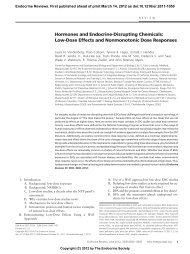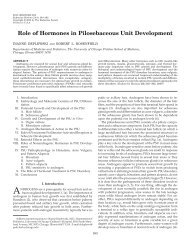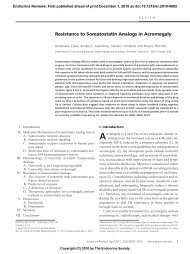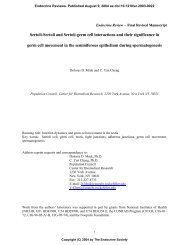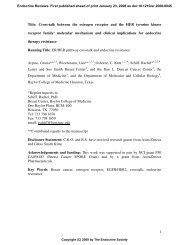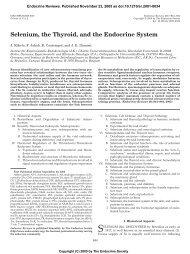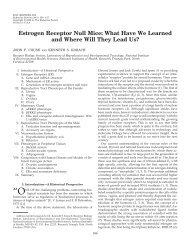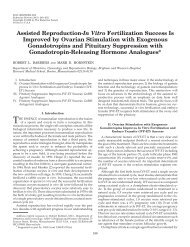1 BETA-CELL FAILURE IN DIABETES AND PRESERVATION BY ...
1 BETA-CELL FAILURE IN DIABETES AND PRESERVATION BY ...
1 BETA-CELL FAILURE IN DIABETES AND PRESERVATION BY ...
You also want an ePaper? Increase the reach of your titles
YUMPU automatically turns print PDFs into web optimized ePapers that Google loves.
61<br />
mathematical model. In a similar study over 52 weeks of vildagliptin added to metformin<br />
treated DM2, an improvement was demonstrated in beta-cell function, with enhanced<br />
postprandial insulin secretion, increased insulin sensitivity and “dispostion index”. Twelve<br />
week treatment of drug-naïve DM2 with vildagliptin (50 mg bid) restored the acute insulin<br />
response to glucose (AIRg) and sensitivity index(Si) determined by FSIVGTT. The<br />
disposition index (AIRg x Si) increased >4-fold and part of its effect remained after 2-4<br />
week washout, suggesting that vildagliptin may exert some disease-modifying effect. Three<br />
recent studies have been carried out in the same line as for sitagliptin. One study compared<br />
vildagliptin (50mg bid) monotherapy with metformin over 52 weeks, with better sustained<br />
control with the DPP-IV inhibitor. In the second study, vildagliptin (50 mg qd or bid) was<br />
added to metformin with improvement of glycemic control slightly better with the larger<br />
dose. The third study compared vildagliptin (100 mg qd) with placebo in insulin-requiring<br />
DM2. After 24 weeks, there was a reduction in HbA1c and in the mean insulin doses.<br />
Single-dose studies indicate that sitagliptin and vildagliptin have similar clinical<br />
efficiency in reducing the glucose excursion after oral glucose.Data are not yet available to<br />
enable comparison of the efficacies of both products in chronic use.<br />
Potential effects on preservation and augmentation of β-cell mass<br />
Regarding the most important question concerning both GLP-1 analogs,<br />
GLP-1R activators and DPP-IV inhibitors(incretin enhancers) – incretin mimetics - is<br />
whether they will be able to slow or prevent the apparently inevitable progress of the<br />
DM2,considering their trophic effects on beta-cells (249), not only stimulating their<br />
proliferation (185, 250) but also enhancing the differentiation of new beta-cells from<br />
progenitor cells in the pancreatic duct epithelium (251) and, perhaps most importantly,<br />
being capable of inhibiting apoptosis of the beta cells including human beta cells (195).<br />
Since the normal number of beta-cells is maintained in a balace between apoptosis and<br />
proliferation, the protective effects of incretin mimetics could be relevant under conditions<br />
in which beta-cell apoptosis is increased, such as in DM2 (4). Since, for obvious reasons, it<br />
is difficult to estimate the protective effects of incretin mimetics on beta-cells in humans<br />
there is no clinical evidences that these drugs really have protective effects on beta cells



